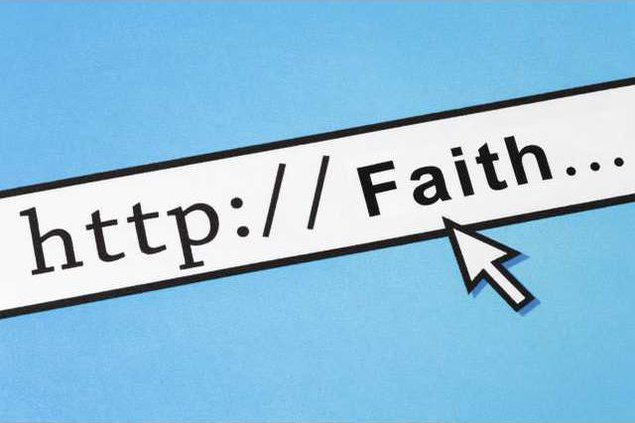One out of every five Americans shares something about their faith online, the Pew Research Center reported this week, and 46 percent of Americans saw a faith-related posting online.
While sharing a Bible verse or religious image isn't the same as walking up to a stranger and offering a religious tract, several evangelical observers point out that the more common sharing of faith online can lead to more serious conversations.
Pew's survey found white evangelicals and black Protestants "far more likely" to having shared their faith online or caught a religious television or talk radio program during the previous week "than other major U.S. religious groups." Regular church attenders are also more likely to share their faith online than non-attenders, the research group said.
Young American adults ages 18-29 were "about twice as likely" to view faith messages shared online than those 50 and older.
Offline, Pew said, nearly six-in-10 white evangelical Protestants said they shared something about their faith in a "real-life" setting, a number that drops to approximately four-in-10 for black Protestants and Catholics. Eighteen percent of "nones," those who identify as unaffiliated, said they shared something about their beliefs, while 34 percent of white members of "mainline," or long-established, Protestant denominations, said they did so.
The figures come at a time when more Americans than ever have incorporated social media into their lives. Last December, Pew's Internet Project reported 73 percent of online Americans used social media. It also comes when the national conversation about faith is increasing thanks to issues including the changing legal definition of marriage and its consequences for faith as well as the recent case of Brittany Maynard, a 29-year-old cancer victim who took medication to end her life on Nov. 1.
Fundamental shift
"Social media are really opening up a lot of different kinds of commentary and conversation that people in the past were reluctant to engage in person-to-person," said Quentin L. Schultze, a professor at Calvin College in Grand Rapids, Michigan. His 2002 book "Habits of the High-Tech Heart: Living Virtuously in the Information Age," was one of several Schultze, an evangelical, has written on the nexus of faith and technology.
Schultze said online activity is leading to offline evangelism. "I think this is a fundamental shift, (and it's) interesting to see how the shift is moving along generationally," he said. "Younger people are feeling freer to talk about matters of faith, both online and in person."
According to veteran technology industry marketer Michelle Diedrich, who now works with the Dallas, Texas, based evangelistic ministry Global Media Outreach, digital contacts replicate "the very traditional door-to-door" method Christians have long used to connect with others.
Online, Diedrich said, "you can connect with more people, share more frequently and it's a good platform for connecting. In the online world, people are very quick to share their reaction to things, and you get very quick feedback."
Global Media Outreach has made "one billion gospel presentations online (in the past) 10 years," Diedrich said, and the group's volunteer missionaries should double that number "in the next two years."
The online exposure has a real-life consequence, Diedrich said, as the group's surveys reveal 62 percent of online volunteers say digital witnessing "gave them more confidence" to share their beliefs face-to-face. And, she added, "73 percent of our volunteers said that because of sharing their faith online, they're spending more time in prayer for others."
Since April of 2011, volunteers working with the Billy Graham Evangelistic Association have made 26 million online presentations of a salvation message, according to John Cass, the ministry's Internet director. Within the week, he said, they expect to record their 5 millionth online decision to accept Jesus.
Continuing trend
Digital witnessing, Cass said, offers the "ability to share quickly and unashamedly; you don't have to really be worried about that confrontation, that moment of hesitation."
He said one potential danger was that newly converted believers could be "opened up to whatever, with no clear direction" unless they find a local congregation where they can be further taught. The Graham organization, he said, stresses the importance of a local church connection for new believers.
Twenty years after the Internet exploded onto the American scene, religious discussions online have remained popular. Alongside evangelical outreaches, many faiths are represented in cyberspace. IslamiCity.com has an active online effort, as does the Chabad Lubavitch movement of Hasidic Judaism.
Email: mkellner@deseretnews.com
Twitter: @Mark_Kellner








